When senior Richard Kim interned at Google last summer, he was fascinated by one of the features of their Wi-Fi network. According to Kim, a computer science major, the “go/” feature at Google allowed interns and employees to create web pages for one another that exist only on the Google Wi-Fi network. Pages such as “go/imstarving” would yield nearby places to eat, while “go/help” would send users to a help resource.
Kim wanted to bring this idea back to Tufts, and the result has been tufts.io.
Tufts.io, as a domain, has a longer and more winding story. The original URL was bought by a student in the Entrepreneurial Leadership Studies (ELS) program who wanted to create a network for entrepreneurs at Tufts, according to Kim.
It was then bought by senior Tom Wang, a computer science major who wanted to create a place for students to build projects online. The domain was then purchased by senior Alex Lenail before Kim obtained it from him.
Kim used the domain to help facilitate the Polyhack hackathon in the fall, of which he was the lead organizer. During the hackathon, he realized that tufts.io could serve a similar purpose as “go/” for computer science students and spent much of last December working on it.
He explained that tufts.io is a sort of archive for computer science projects that students build over the years.
“If someone builds a Rate My Professors for Tufts, then they submit it to this [tufts.io]," Kim said. "In five years time, if someone wants to build a new Rate My Professors for Tufts, then it’ll exist here in the archive, almost like a Google for Tufts projects.”
Kim hopes that through this domain, computer science majors will be able to more easily collaborate on projects and pass their projects down to future generations. He sees this as the solution to a real problem with the computer science department and among its students.
“Tufts CS isn’t cumulative, that’s the problem,” Kim said. “One of the differences between Tufts CS, Harvard CS and MIT CS is that at MIT, when students build a project, I think a lot of the time it has an impact and stays around.”
Tufts.io, which was co-created by junior Max Bernstein, has already been put to use for this purpose. One example of the numerous projects on tufts.io is StudentBridge, an Android app developed by senior Nicholas Carlino and junior Georgios Papakostas. StudentBridge allows students or teachers who are a part of a university to ask any questions to be answered by others from around their university community.
Many of the projects on tufts.io are final projects from computer science classes such as COMP 20: Web Programming or COMP 150: Mobile Development.
The current iteration of tufts.io is fairly different from Kim’s initial vision. Kim had wanted to create a platform that any member of the Tufts community could use to build web pages that would only be available to Tufts Wi-Fi users.
However, Tufts Technology Services (TTS) turned down this idea last semester. According to Kim, TTS argued that without any way to regulate the pages created and the content that would go on the site, it could pose security threats to users and to the university.
The future of tufts.io might lie outside of the computer science community. Sophomore Selena Groh, the producer of Torn Ticket II’s spring musical "Chicago," said that the site also has potential as a link shortener, much like TinyURL or bitly.
Torn Ticket II used the site to feature programs for "Chicago" online, which proved to be more cost effective than printing the programs.
“I thought it would be nice to just have tufts.io/chicago,” Groh said. “And since there is less on tufts.io, you have a choice of what you want the slash to be. I was trying to find that online. Apparently a lot of places don’t let you do that, but tufts.io did.”
As of now, Kim has turned his attention to a project known as JumboSmash, a dating app for seniors that will be launched during senior week. Kim hopes that Bernstein will continue to work on the app after he graduates.
Bernstein, also a computer science major, has some ideas for how to further develop the project, but hasn’t nailed down the specifics just yet. In particular, he would like to try to make the domain specific to Tufts Wi-Fi, despite the concerns of TTS.
“I had some initial ideas that would involve requiring users to add a setting or two to their computers to get [that] kind of functionality,” Bernstein said. “I have qualms with these ideas though. They would give the maintainer of the service far too much power over how people using tufts.io would view the internet. ... I think it's certainly possible with some imagination and a bit of persuasion, but I don't know the answer yet.”






